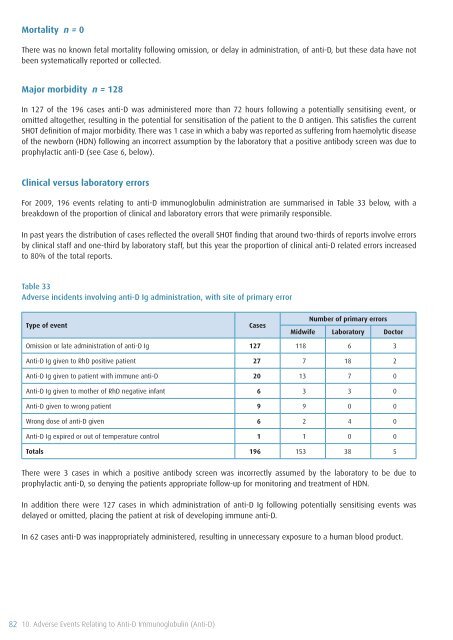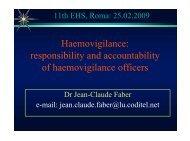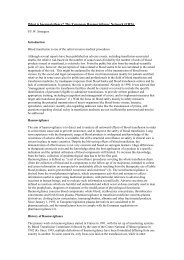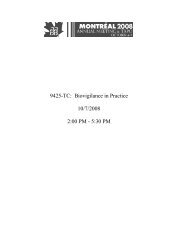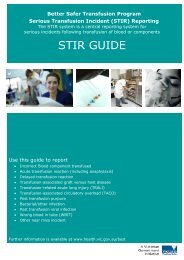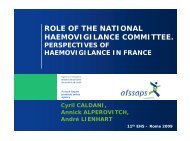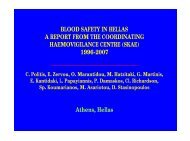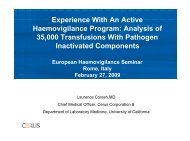SHOT Annual Report 2009 - Serious Hazards of Transfusion
SHOT Annual Report 2009 - Serious Hazards of Transfusion
SHOT Annual Report 2009 - Serious Hazards of Transfusion
You also want an ePaper? Increase the reach of your titles
YUMPU automatically turns print PDFs into web optimized ePapers that Google loves.
Mortality n = 0<br />
There was no known fetal mortality following omission, or delay in administration, <strong>of</strong> anti-D, but these data have not<br />
been systematically reported or collected.<br />
Major morbidity n = 128<br />
In 127 <strong>of</strong> the 196 cases anti-D was administered more than 72 hours following a potentially sensitising event, or<br />
omitted altogether, resulting in the potential for sensitisation <strong>of</strong> the patient to the D antigen. This satisfies the current<br />
<strong>SHOT</strong> definition <strong>of</strong> major morbidity. There was 1 case in which a baby was reported as suffering from haemolytic disease<br />
<strong>of</strong> the newborn (HDN) following an incorrect assumption by the laboratory that a positive antibody screen was due to<br />
prophylactic anti-D (see Case 6, below).<br />
Clinical versus laboratory errors<br />
For <strong>2009</strong>, 196 events relating to anti-D immunoglobulin administration are summarised in Table 33 below, with a<br />
breakdown <strong>of</strong> the proportion <strong>of</strong> clinical and laboratory errors that were primarily responsible.<br />
In past years the distribution <strong>of</strong> cases reflected the overall <strong>SHOT</strong> finding that around two-thirds <strong>of</strong> reports involve errors<br />
by clinical staff and one-third by laboratory staff, but this year the proportion <strong>of</strong> clinical anti-D related errors increased<br />
to 80% <strong>of</strong> the total reports.<br />
Table 33<br />
Adverse incidents involving anti-D Ig administration, with site <strong>of</strong> primary error<br />
Type <strong>of</strong> event<br />
Cases<br />
Number <strong>of</strong> primary errors<br />
Midwife Laboratory Doctor<br />
Omission or late administration <strong>of</strong> anti-D Ig 127 118 6 3<br />
Anti-D Ig given to RhD positive patient 27 7 18 2<br />
Anti-D Ig given to patient with immune anti-D 20 13 7 0<br />
Anti-D Ig given to mother <strong>of</strong> RhD negative infant 6 3 3 0<br />
Anti-D given to wrong patient 9 9 0 0<br />
Wrong dose <strong>of</strong> anti-D given 6 2 4 0<br />
Anti-D Ig expired or out <strong>of</strong> temperature control 1 1 0 0<br />
Totals 196 153 38 5<br />
There were 3 cases in which a positive antibody screen was incorrectly assumed by the laboratory to be due to<br />
prophylactic anti-D, so denying the patients appropriate follow-up for monitoring and treatment <strong>of</strong> HDN.<br />
In addition there were 127 cases in which administration <strong>of</strong> anti-D Ig following potentially sensitising events was<br />
delayed or omitted, placing the patient at risk <strong>of</strong> developing immune anti-D.<br />
In 62 cases anti-D was inappropriately administered, resulting in unnecessary exposure to a human blood product.<br />
82 10. Adverse Events Relating to Anti-D Immunoglobulin (Anti-D)


